Virginia Cowles was an astonishing woman who wrote an amazing memoir about her experiences as a war correspondent in Europe from 1936 until 1941. She called her memoir Looking For Trouble/The classic memoir of a trailblazing war correspondent...https://www.amazon.com/Looking-Trouble-Virginia-Cowles-ebook/dp/B006GACKY2/ref=tmm_kin_swatch_0?_encoding=UTF8&qid=1644513830&sr=1-1.
Reading her memoir in the uncertain times in which we live is a refreshing and ultimately hopeful experience. She writes about times that were unquestionably dark. She met Mussolini. She attended a Nazi rally. She covered both sides of the Spanish Civil War which was an extremely dangerous thing to do. She visited Stalin's Soviet Union.
 |
| Virginia Cowles 1910 - 1983 |
She began her career as a war correspondent with virtually no prior experience. She had covered the fashion and society beat for the Hearst papers. Yet she was determined to be even handed in her coverage of the Spanish Civil War. She toured Republican Spain which was subdivided into many factions ranging from Trotskyites to Socialists. She also visited with Franco's Nationalist forces who were aided by significant support from Mussolini's Italy and Hitler's Germany.
She met Ernest Hemingway and was a friend of his wife Martha Gelhorn. Hemingway confided in her declaring that war was "the nastiest thing that human beings can do to each other...but the most exciting." Ghoulish but accurate!
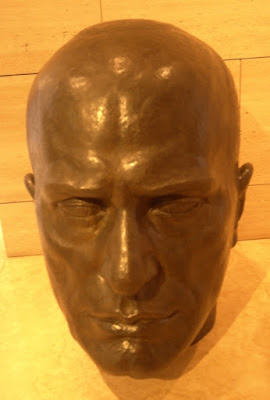 |
| Benito Mussolini 1883 - 1945 |
Cowles met Mussolini in Rome at his Palazzo for a personal interview. She found the Italian dictator to be aggressive and flamboyant. Cowles concluded, "You can the Italians what to do, but, thank God, you can't tell me!"
She attended a rally of Nazis at Nuremberg, taking note of the flaming torches and fanaticism of the participants.
Cowles tried to be scrupulously fair and open minded. She visited Stalin's Soviet Union where she discovered totalitarianism of the Left to be anything but a worker's paradise.
Again and again Cowles goes looking for trouble. She was in Czechoslovakia before the Germans took it over in 1938. She was in Paris just before the fall of France in 1940. She was an eyewitness to war and the humanitarian disasters that inevitably follow in its wake.
In analyzing fictional works there is often a discussion of the progress of a character through the work. Perhaps the most astonishing thing about Cowles' work is her own progress through this volume. She begins in 1936 as earnest reporter attempting to portray both sides of the Spanish Civil War. By late 1940 (following the invasion of Poland in September 1939 and the Battle of Britain in the summer of 1940) Cowles emerges as an eloquent advocate for American intervention on the Allied side against the Axis. She was clearly repelled the extreme cynicism of the dictators (sound familiar in the context of Putin's propaganda against Ukraine now?). Hitler claims to be interested in the minority rights of the Sudeten Germans while he wants simply to devour Czechoslovakia whole. Stalin's Soviet Union supports Republican Spain but also holds onto Spain's gold reserve. Hitler and Stalin dispense with ideological differences in order to carve up Poland with the Molotov-Ribbentrop pact.
Cowles the journalist was disgusted by the grotesque propaganda deployed by Hitler and others. She wrote, "To-day, it is no exaggeration to claim that out of the eleven countries smashed and overrun by Germany, half of them were destroyed, not by tanks, but by propaganda."
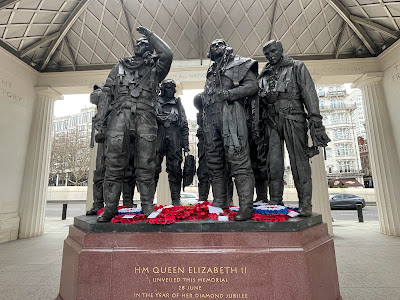 |
| RAF Bomber Command Memorial Green Park, London |
It was not, of course, Cowles's eloquence or Murrow's reporting that propelled the United States into war but rather the Japanese attack on Pearl Harbor. But Cowles, Murrow and others laid the groundwork for the Anglo-American alliance the would eventually ground Germany into dust. Cowles herself formed her own "special relationship" marrying an RAF pilot (Aidan Crawley) in 1945.
With Putin's invasion of Ukraine it is abundantly clear that we live in uncertain and worrying times. Remember the Chinese curse, "May you live in interesting times!" We certainly do live in interesting times. The dictator Putin is now employing propaganda tactics that would make Goebbels blush (Ukraine requires denazification, etc.).
Perhaps the ultimate value of a work such as Cowles' work Looking For Trouble is the reassuring message that other women and men have faced similar challenges with honesty and courage, endured much suffering but eventually emerged triumphant. The West can and must rise to the challenge posed by the cynical propaganda-spouting dictators of the 21st century.
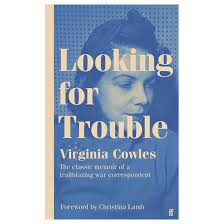
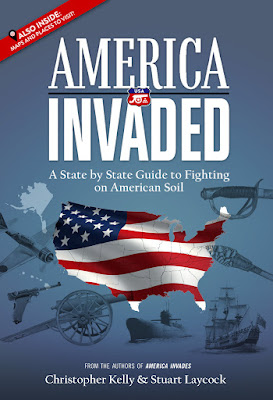
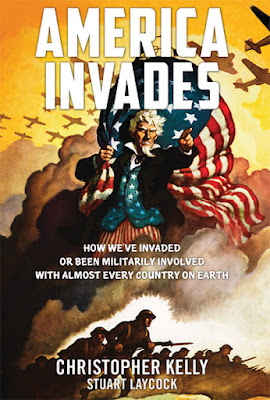
No comments:
Post a Comment